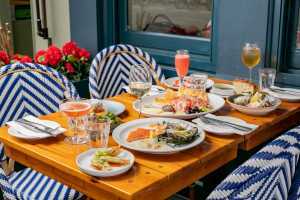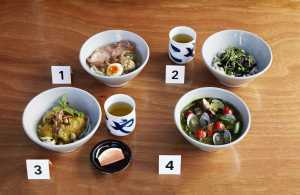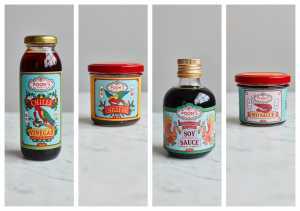This January, renowned wild British restaurant Native will launch its ‘Regenuary’ offering; a 6-course seasonal menu to celebrate and draw attention to the British regenerative farming cycle.
The Regenuary menu will replace Native’s set menu for January, and demonstrates co-founders Imogen Davis and Ivan Tisdall-Downes’ longstanding unique approach to British heritage cooking. Their ethos is to show that hospitality and cooking with resourcefulness and creativity can preserve and give back to the UK’s biodiversity (particularly the soil and environment). In signature Native style, the menu will showcase a wealth of foraged herbs, vegetables and seaweeds gathered fresh from the shores of the UK, and will pay particular attention to vegetables, with sustainable meat playing an important but supporting role in the Regenuary menu. Produce is sent to the restaurant direct from farms near London (via Shrub Provisions), with the aim of minimising the number of deliveries into the city.
The menu has been created to represent the stages of the regenerative farming cycle, with each course intertwined with the previous and next to educate diners on the cyclical nature of regen farming in an accessible way. From its ‘compost’ course of zero-waste snacks representing the nutrient-rich foundations of the farming process, right through to the jerusalem artichoke mille-feuille dessert that uses the ‘fruits of the soil’, Native’s Regenuary menu is an innovative reflection of Native’s “what grows together, goes together” approach to cooking. Priced at £59pp, the menu includes:
SOIL:Compost broth, compost pakora
A selection of snacks using ingredients that would have ordinarily been waste, reflecting the importance of nutrient-rich compost to enrich the soil for crop harvesting.
FIRST ROTATION:Native x Wildfarmed focaccia, confit garlic rapeseed oil
The bread course offers Native’s moreish, chewy focaccia using grain straight from the fields of sustainable baking pioneers Wildfarmed to pay homage to the product resulting from a system that prioritises soil health to produce nutrient-dense food. Wildfarmed’s method allows arable crops to be grown alongside perennial plants, returning biodiversity to the otherwise fields of single crops that cover two thirds of the UK.
NO TILL:Alexander leaf velouté, fresh curds, rye crumb
This dish demonstrates the benefits of the ‘no till’ farming method, which avoids the use of heavy machinery to prepare the land for crops. This reduces damage to soil structure and keeps more organic matter in the soil, improving its quality. Here, Tisdall-Downes is looking to demonstrate the escape of CO2 from the earth when tilling occurs through an Alexander leaf velouté with fresh curds and rye crumb.
COVER CROP:Tunworth custard, cover crop grains, black garlic with an onion and bone marrow broth
Tisdall-Downes’s take on a risotto, using produce harvested from the ‘cover crop’, the next step in the regenerative farming process. After the cash crop is harvested, the likes of fava and barley are planted to prevent soil erosion on the farmland which is otherwise left empty and exposed in the interim period before the cash crop is re-planted. The dish is supported by award-winning Tunworth cheese made with milk from the progressive Rotherfield Park, whose mission to soil continuously using regen farming methods has been at the forefront of wildlife conservation for many years.
HOLISTIC GRAZING:Retired dairy cow and fodder
Each guest will experience a slightly different version of this course as Native use their in-house butchery skills to extrapolate the most flavourful, varied cuts from one carcass, rejecting the unsustainable idea of ‘prime cuts’. Meat comes from Swaledale and will sit alongside vegetable-centric dishes in recognition of grazing as an essential part of the regenerative farming process that enriches the soil with organic matter. The meat is a highly revered ingredient on the menu, but unlike traditional British cooking, it complements rather than dominates the other elements of the dish.
Also, reflecting Native’s nose-to-tail ethos, any offcuts of the animal will be used in the compost snacks to bring maximum flavour and minimum waste. Vegetarian alternatives will also be available.
SOIL: Jerusalem artichoke mille-feuille
Finally, Tisdall-Downes will return to the soil with a dessert centred around root vegetables, in the form of a Jerusalem artichoke mille-feuille that brings an earthy sweetness to round off the menu.
There will be the option to pair the menu with a curated selection of cocktails with a regen twist using spirits from Discarded and foraged and waste ingredients such as Native’s compost cordial, and with natural wines from across Europe from the restaurant’s extensive by-the-glass offering.
Of the menu, Imogen Davis said: “We are truly excited to be able to express what we believe is the future of food, reimagining what our plates will look like and helping to rewild our planet”.
Native’s Regenuary menu will be available for lunch and dinner from 4th to 29th January inclusive. Bookings are essential at nativerestaurant.co.uk/bookings.
Native at Browns, 39 Brook Street W1K 4JE
Nativerestaurant.co.uk | @eatnative
About Native
Native is the first restaurant venture of university friends Ivan Tisdall-Downes and Imogen Davis. Following a series of pop-ups and street food markets, Ivan and Imogen settled into their first permanent site in Neal’s Yard in 2016, before relocating to London Bridge in July 2018 following a successful crowdfunding campaign. Native relocated to Browns department store in Mayfair in 2021. Native champions British wild produce with a foraged focused menu. Ivan, Imogen and the team are dedicated to maintaining and working towards a zero waste kitchen and work hard to cook only using sustainable meat and seafood with the daily changing menu dependent on seasonal availability.
About Imogen Davis and Ivan Tisdall-Downes
Entirely self-taught, Ivan has completed stages at The River Cottage and Dan Barber’s Blue Hill Farm at Stone Barns, honing his skills and developing his enthusiasm for natural, foraged and seasonal produce. Despite a long-held love of food, Ivan did not consider a career in the industry until his parents left London and he was forced to spend a summer in the countryside, where he quickly gained an appreciation for Britain’s wild produce. The joy of giving people happiness through food persuaded Ivan to turn his passion into his livelihood. Having grown up in rural Northamptonshire, Imogen has always had an affinity with nature. As a born hunter-gatherer, she mastered the arts of foraging, plucking and skinning from an early age. Imogen’s incredible palate for Britain’s wild food has been widely recognised, notably having been named as one of Grace Dent’s ’10 people to watch in the food industry’ in 2017.





